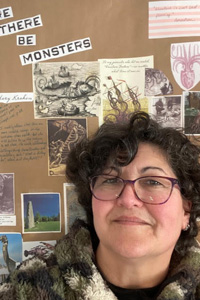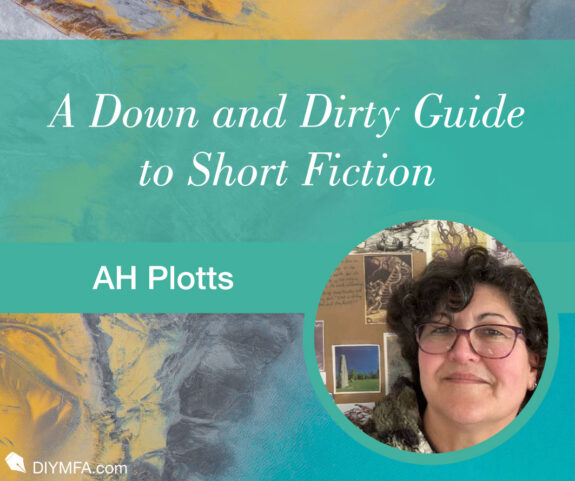What Is A Short Story?
For the most part, a short story is most often defined by word count (1,000 – 7,500 words) and the complexity of the story. It’s easiest to define a short story by comparing it to longer forms of fiction, such as novels. Short stories generally have a fewer number of main characters and a less complex plot than novels do.
Here’s my definition of a short story, or any story in a nutshell: there’s a beginning, a middle and an end; one or more characters who experience a crisis of some sort; and those characters either succumb to or overcome the crisis in their attempt to achieve what they want the most. Phew, that’s a lot of words!
Of course, now that I wrote that perfect definition (lol), I find myself thinking of all the short stories I’ve read that don’t quite fit. Which leads me to what many writers seem to agree on: what makes up a short story is difficult to define. Readers and writers of short stories seem to know what a short story is when they read or write one. It’s more of a feeling when you get to the end of a short story. You’re satisfied, entertained, and it feels finished.
What Does All This Mean For Writing A Short Story?
In some ways, writing shorter forms of fiction can be more challenging than writing long forms. You have fewer words in which to get your point across. All words and phrases are more crucial. I think about writing short forms of fiction as more deliberate, more focused writing than when I’m working on my novel, and short stories are great formats for experimentation.
How I Write A Short Story
I’m no expert, by any means, but I do love writing short stories. My first step is usually brainstorming an idea that’s not fully formed. It might be a character, a situation or event, or a place that I want to write about. I think about what the character(s) is/are trying to achieve, how the situation or event will impact them and their environment, and why the setting is important.
Ultimately, I need characters who are motivated to get what they want, a crisis or problem they need to deal with, rising tension and obstacles to challenge them, and ultimately a resolution of some kind. Will my characters succumb to the crisis/conflict/obstacles, or will they find a way out or around?
None of this is that different from a story for a novel, right? The real difference is that all these elements are condensed in a short story. Word choice, phrasing, and voice become even more important. Tension and conflicts happen fast. I write horror and that means continuous tension until the climax or beyond.
Short stories are perfect venues for surprise endings, a plot twist, or what James Joyce referred to as “an epiphany” at or near the end of the story: at least one character learns something about themselves that they didn’t know or acknowledge at the beginning.
Finally, I need to think about the structure I want to use for my short story. Structure is where I think short stories differ most widely from longer forms of fiction. I’ve read short stories that are mostly narrative, with very little or no dialogue and intriguing descriptions. Epistolary short stories use newspaper or magazine articles, letters, email, and text messages to tell the tale. I’ve read an amazing short story that was told through handwritten comments in the margins of a printed memo. I’m working on a story now that will be told through mixed media, such as online “clickbait” and receipts for items purchased by the characters.
One of the great things about writing short stories is that they are short. If one format doesn’t seem to work, you can stop and try a different form without feeling like you’ve failed. So go for it. It doesn’t hurt to try. All writing is good practice!
How To Read Short Stories
I hope you already read short fiction but if you don’t, you’re missing out on the most popular form of fiction today. Short stories offer readers thoughtful entertainment in a package small enough to consume, ideally, “in one sitting” with “a certain unique or single effect” according to Edgar Allan Poe, one of the progenitors of the short form.
From a reader’s perspective, what makes a short story “good” or “great?” Alice LaPlante in The Making of a Story states that the only requirements for a short story besides word count (20,000 words or less in her book) are that it “be interesting, resist paraphrasing, and end up providing some unit of satisfaction, or sense of completeness, to the reader (pg.155).”
I find reading short stories one of the best ways to figure out how to write them. If you’re curious about how the author ended the story, start there and work your way back to the beginning. Look for the important plot points and author’s decisions along the way. Try this with today’s story after you read through it the first time.
Reading As Writers:
Shirley Jackson’s – The Lottery
The Lottery was first published in The New Yorker magazine on June 28, 1948. Written by one of the most revered icons of horror fiction, Shirley Jackson was both lauded and reviled when this story first came out. This is one of my favorite short stories of all time and I know it well. It’s one of the first stories that gave me a chilling, aha moment toward the end. I think it beautifully showcases the power and impact of simplicity in short fiction.
I love that Jackson was a trailblazing woman writing fiction that was considered “so un-lady like.” I’m also inspired by this story’s publication history. Jackson wrote in her essay The Public Reception of “The Lottery,” “I didn’t think it was perfect, but I didn’t want to fuss with it.” Jackson’s own agent “did not care” for the story but he sold it to The New Yorker. The fiction editor at The New Yorker didn’t like it, either. Yet, The Lottery remains one of the best examples of short horror fiction I know. It’s chilling and filled with dread without the use of blood, gore, or cheap scares.
Beware Of Spoilers To Follow!
If you haven’t already read The Lottery you may want to take a few minutes to read it before continuing with this article. You can find the story online, at The New Yorker Magazine ( “The Lottery,” by Shirley Jackson | The New Yorker) or from Middlebury College (The Lottery–Shirley Jackson (bpb-us-e2.wpmucdn.com).
Simply put, this story is about an unsettling ritual that takes place in a small town. We assume the town is small because everyone seems to know each other when they assemble in the town’s square. We guess that the town is in the U.S. because of the colloquial English that’s being spoken by the characters. We can safely surmise that the author has made specific choices because the story is so good and so short (less than 4,000 words). Nothing in this story is coincidental.
We’re dropped in medias res (in the middle of things) as the lottery is just getting started. The story opens on a beautiful day in this fictional town. The sun is shining, the grass is green, and the flowers are blooming. Right out of the gate, the author disarms us with a lovely picture of a pleasant day in Any-Town, USA. How can anything terrible happen?
I appreciate how Jackson holds back on describing too much about the lottery. We read that it’s a regular gathering of the townspeople, similar to other traditional get-togethers such as square dances, teen clubs, and Halloween events. This comparison by the author makes the lottery seem harmless. Hmm, nothing scary here . . .
In the next few paragraphs, we learn more about the preparation for the lottery. There’s a discussion about the black box and the sustenance of the rituals, as if all are sacred. Yet, some practices – the salute when people come up to receive their pieces of paper out of the black box, the walk among the people by the Official of the lottery – have been allowed to lapse. What does this tell us about the nature of the lottery and its importance? It’s as old as the town itself. It’s changed over the years in some ways but not others. As a reader, I’m starting to doubt the importance of the lottery and why it needs to continue.
Things get more suspenseful when the townspeople start receiving their papers – I find it interesting that the author has the men pull the papers from the black box. This act speaks volumes to me. This town could be unnecessarily stuck in its old ways. There’s something wrong with this lottery.
When one household is identified by the papers drawn from the black box, that man’s wife protests the unfairness of it all. She’s told to “be a good sport” and to “shut up.” This riles me. I’m offended by the way the wife is treated. It adds to the overall weirdness and tension invoked by these events. Apparently not all the people in town are in favor of what’s transpiring and now I’m not, either.
One individual from the chosen household is at last identified by a single dot on one of the papers. It’s the wife who was complaining. A dot seems so insignificant, yet it shows us how inane the ritual has become. How one small mark seals the fate of one person in this town – and isn’t it interesting who it ends up being?
I think the one line that says everything we need to know about this story is near the end: “Although the villagers had forgotten the ritual and lost the original black box, they still remembered to use the stones.” Now we learn about the pile of stones and can guess the reason for the lottery: to choose a villager to be sacrificed by the rest of the townsfolk.
Now It’s Your Turn!
What are your thoughts about The Lottery? Which short stories have stayed with you? How do they impact your writing or stir your emotions the way The Lottery does for me?
We’ll delve into a different form of short fiction next time. Until then, I look forward to reading your comments below!

A.H. Plotts writes and watches horror and dark sci-fi stories. She also likes playing in her garden, catching the waves, and eating delicious food on the California coast. Find her rantings all about it at www.ahplottsthecoast.com.







